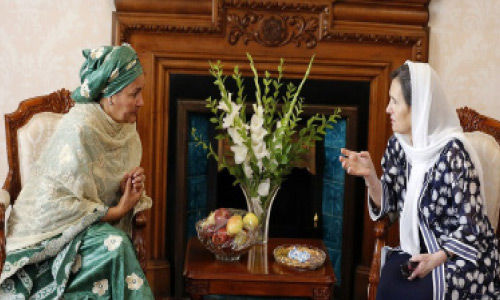KABUL - KABUL (Pajhwok): Top UN officials have underlined the need for Inclusive peace in Afghanistan, seeking a central role for women in reconciliation talks.
UN deputy chief Amina Mohammed, who led an all-women delegation for a two-day solidarity mission, said they focused on women, peace and security.
Speaking to journalists in Kabul on Sunday, she said: “We have been impressed with the leadership at all levels of government from Kabul out to the local areas…”
She was immensely impressed with seeing an investment in people, particularly in women’s empowerment.
She was joined by UN Political and Peacebuilding Affairs chief Rosemary DiCarlo, Executive Director of the UN Population Fund (UNFPA) Natalia Kanem and UN Women head Phumzile Mlambo-Ngcuka.
The deputy secretary-general said they had come before the key presidential election, due to take place at the end of September, but also to lend their support for the peace process.
She stressed the need for a peace drive that was integral to the future and sustainability of all efforts and aspirations the Afghan government and people had.
The mission came days after a bomb attack outside the Kabul University killed 10 people - students and a traffic officer - and wounded 33 others.
Elsewhere in the country, Taliban detonated a bomb outside police headquarters in Kandahar City, killing 11 and wounding nearly 90.
Despite the on-going violence, Afghan leaders held ground-breaking talks in Qatar earlier this week with Taliban representatives, with both sides calling for a reduction in civilian casualties.
The UN delegation met President Ashraf Ghani and Chief Executive Abdullah on Saturday. The delegates also met a diverse group of women, hosted by First Lady Rula Ghani.
They also met religious leaders, who have a crucial role to play in bolstering the peace process, said a statement from UNAMA.
On Sunday, the delegation travelled to Bamyan province, where UNFPA is running a series of support programmes and services for women of reproductive age and families, as well as tackling gender-based violence (GBV).
They also visited a UN demining site and the UNESCO World Heritage Site of the Buddhas of Bamyan, which were dynamited and destroyed by the Taliban in March 2001.
The deputy chief said her face-to-face conversations with Afghan women had left her with no doubt that women were “in leadership roles, decision-making, they know exactly where they want to go and what they need from us is support.”
“We have heard from them many messages: on the elections, that they must be credible, they must be timely, they must be inclusive, and their voices must be heard."
On the peace process, she said it had to be inclusive: “And inclusive means women at the centre,” especially when it comes to addressing the needs of victims of violence.
“You cannot address peace and its sustainability, if you cannot come to terms with reconciling the past. So this has been an incredibly important opportunity for us.”
The deputy secretary-general noted during the trip they had also been gratified to see the gains of the investments made by the UN system and its partners over the years.
The UN Women chief said she had been struck by talking to women who had lived with the “oppressive legacy of the Taliban’s rule – which banned them from attending school, work or even speaking publicly or leaving the house without a man.”
“The same women have consistently and courageously advocated for their voices to be heard, their priorities to be addressed and their agency to be recognised”, remarked Mlambo-Ngcuka.
“And they do not stand alone, because UN Women and the UN, are here to back them up at every step.”
She said as the momentum built for peace talks with the Taliban, “ensuring women’s meaningful participation in the process and in the upcoming elections is more urgent than ever.
“Women must be able to exercise their right to define what peace means for them, and to have a seat at the table where the future of the country is being negotiated”, said the executive director.
“Only then we will really see durable peace and democracy flourish in Afghanistan.” (Pajhwok)
Home » Afghanistan » Women’s Role in Peace Process Essential: UN
Women’s Role in Peace Process Essential: UN

